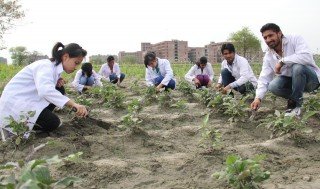SCCN Blogs
Organic, Smart Solution
The concept of organic farming is not a new thing for the farmers of India, it has been in practice since ancient times. The primary aim of organic farming is to help the soil stay in good health through the use of biological and organic wastes to produce nutritious food. Using organic farming technique helps in sustainable and pollution free production of food.
This was certainly very clear from our Prime Ministers speech from the rampart of Red Fort on 73rdIndependence Day of India where he asked farmers to opt for organic farming and save the mother earth from being exploited by extensive use of harmful pesticides and chemicals. For helping the Indian farmers the government is coming up with projects to restart the irrigation projects, linking agriculture with innovation & technology through agriculture expert policy and providing 1.5 times of the minimum support price. The manner in which the north eastern states are making progress in organic farming is certainly setting up an example for the entire nation to follow organic farming for a sustainable and better future.
Here comes the role of the Agricultural colleges to act as a torch bearer for making a revolution in the India agriculture sector by turning it completely into organic and sustainable farming. Agriculture, with its allied sectors is the largest source of livelihood in India. In India still 65% of its population depends primarily on agriculture. According to the World of Organic Agriculture 2018 report, India is home to 30% of the total organic producers in the world, but accounts for just 2.59 per cent (1.5 million hectares) of the total organic cultivation area of 57.8 million hectares. If the farmers are trained for effectively growing crops in organic manner then the time is no far where India will be the largest producer and exporter of organic food across the globe.
Agricultural colleges and universities can come up with initiative like the Campus Student Organic Farm (CSOF) at Oakland University which is a community of students, faculty and staff committed to nourish the local community through exceptional education and community engagement programs for producing fresh and healthy food. The CSOF is a diversified organic vegetable farm currently growing over 50 different types of vegetables, fruits, flowers and herbs. Therefore such initiatives can be taken up to promote this sustainable way of farming among the farmers to have a better produce and market.
The government of India targets to increase the average income of a farmer household from Rs 96,703 (US$ 1,505.27) in 2015-16 to Rs 219,724 (US$ 3,420.21) by 2022-23. With the increase in health consciousness, the demand for organic food is set to increase at much greater rate and make its way into kitchens. This could definitely help the farmers to double their income just by a change in their practice. Every transition takes time and has to face many challenges, here comes the role of the agricultural colleges and universities to ease this transition through their expertise and support to the Indian farmers.
Smart Campus Cloud Network (sccnhub.com) facilitates such smart and sustainable approach in educational campuses, as a prime objective to contribute to Smart India and UN SDGs.
References:
- Ministry of Statistics and Programme Implementation
- Ministry of Agriculture and Farmers Welfare
- http://www.fao.org/india/fao-in-india/india-at-a-glance/en/
- https://www.downtoearth.org.in/news/agriculture/india-has-the-highest-number-of-organic-farmers-globally-but-most-of-them-are-struggling-61289
When you subscribe to the blog, we will send you an e-mail when there are new updates on the site so you wouldn't miss them.






Comments